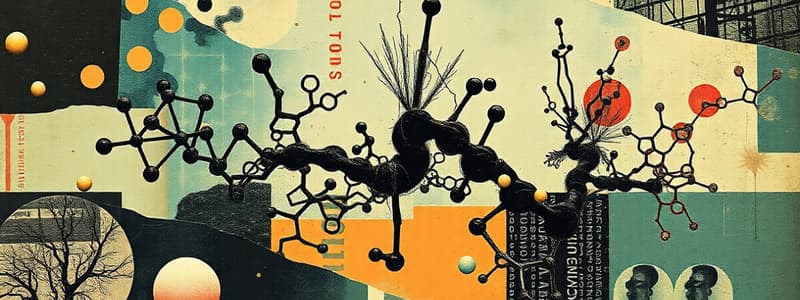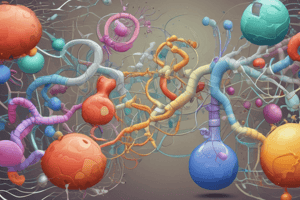Podcast
Questions and Answers
Which of the following represents the components linked to the alpha carbon of an amino acid?
Which of the following represents the components linked to the alpha carbon of an amino acid?
- Amino group, carboxyl group, R group, hydrogen atom (correct)
- Amino group, carbon group, phosphate group, hydrogen atom
- Nitrogen group, hydroxyl group, alkyl group, oxygen atom
- Amino group, carbonyl group, hydrocarbon chain, sulfur atom
What is the classification of amino acids based on their polarity?
What is the classification of amino acids based on their polarity?
- Structural classification
- Chemical classification (correct)
- Metabolic classification
- Protein classification
Which classification includes amino acids that cannot be synthesized by the human body?
Which classification includes amino acids that cannot be synthesized by the human body?
- Non-Polar Aliphatic Amino Acids
- Non-essential Amino Acids
- Essential Amino Acids (correct)
- Ketogenic Amino Acids
Which of the following is NOT one of the twenty common amino acids?
Which of the following is NOT one of the twenty common amino acids?
Which group contains amino acids that are non-polar and aliphatic?
Which group contains amino acids that are non-polar and aliphatic?
Which of the following amino acids is classified as polar and negatively charged?
Which of the following amino acids is classified as polar and negatively charged?
What are essential amino acids?
What are essential amino acids?
What is a characteristic of the R group in amino acids?
What is a characteristic of the R group in amino acids?
Which group of amino acids can be converted into glucose?
Which group of amino acids can be converted into glucose?
Which of the following amino acids is classified as non-essential?
Which of the following amino acids is classified as non-essential?
Which of these amino acids is classified as essential?
Which of these amino acids is classified as essential?
Amino acids that yield glucose upon catabolism are classified as:
Amino acids that yield glucose upon catabolism are classified as:
How are amino acids classified nutritionally?
How are amino acids classified nutritionally?
Which amino acid group includes branched-chain amino acids?
Which amino acid group includes branched-chain amino acids?
Which of the following amino acids is part of the aromatic classification?
Which of the following amino acids is part of the aromatic classification?
Which classification contains amino acids that are polar and uncharged?
Which classification contains amino acids that are polar and uncharged?
What is one characteristic of toxic ammonia in amino acid metabolism?
What is one characteristic of toxic ammonia in amino acid metabolism?
Histidine is categorized under which classification of amino acids?
Histidine is categorized under which classification of amino acids?
Which amino acid is classified as polar and has a negatively charged R group?
Which amino acid is classified as polar and has a negatively charged R group?
Which symptom is NOT associated with hyperammonaemia?
Which symptom is NOT associated with hyperammonaemia?
What dietary restriction is crucial for patients with inherited defects of urea synthesizing enzymes?
What dietary restriction is crucial for patients with inherited defects of urea synthesizing enzymes?
Which category do amino acids that can be converted into glucose fall under?
Which category do amino acids that can be converted into glucose fall under?
What is the consequence of carbamoyl phosphate synthase I deficiency?
What is the consequence of carbamoyl phosphate synthase I deficiency?
Which of the following amino acids is solely categorized as ketogenic?
Which of the following amino acids is solely categorized as ketogenic?
Which deficiency is characterized by elevated argininosuccinate levels in blood, cerebrospinal fluid, and urine?
Which deficiency is characterized by elevated argininosuccinate levels in blood, cerebrospinal fluid, and urine?
Which enzyme deficiency produces increased levels of citrulline in the plasma and cerebrospinal fluid?
Which enzyme deficiency produces increased levels of citrulline in the plasma and cerebrospinal fluid?
Which metabolic intermediate is glucogenic amino acids converted into?
Which metabolic intermediate is glucogenic amino acids converted into?
What is a characteristic of both glucogenic and ketogenic amino acids?
What is a characteristic of both glucogenic and ketogenic amino acids?
What management strategy helps prevent hyperammonaemia in patients with urea cycle defects?
What management strategy helps prevent hyperammonaemia in patients with urea cycle defects?
Which of the following amino acids is considered an uncommon amino acid due to modification?
Which of the following amino acids is considered an uncommon amino acid due to modification?
Which amino acid is NOT categorized under glucogenic amino acids?
Which amino acid is NOT categorized under glucogenic amino acids?
What is the main purpose of ketogenic amino acids in metabolism?
What is the main purpose of ketogenic amino acids in metabolism?
Which of the following amino acids is specifically listed as a glucogenic amino acid?
Which of the following amino acids is specifically listed as a glucogenic amino acid?
What type of amino acids are found in the cells but not included in proteins?
What type of amino acids are found in the cells but not included in proteins?
What is a defining feature of glucogenic amino acids?
What is a defining feature of glucogenic amino acids?
What is a primary function of ammonia in mammalian cells?
What is a primary function of ammonia in mammalian cells?
How does accumulated ammonia affect neuron function?
How does accumulated ammonia affect neuron function?
What is the immediate fate of excess ammonia in peripheral tissues?
What is the immediate fate of excess ammonia in peripheral tissues?
Which of the following describes organisms that excrete ammonia as urea?
Which of the following describes organisms that excrete ammonia as urea?
What is one consequence of increased glutamine synthesis in the brain due to ammonia toxicity?
What is one consequence of increased glutamine synthesis in the brain due to ammonia toxicity?
What is the role of glutaminase in ammonia metabolism in the liver?
What is the role of glutaminase in ammonia metabolism in the liver?
Which of the following physiological states can lead to ammonia toxicity?
Which of the following physiological states can lead to ammonia toxicity?
What primary effect does ammonia have on the acid-base balance in the body?
What primary effect does ammonia have on the acid-base balance in the body?
Which process primarily leads to the production of ammonia in the body?
Which process primarily leads to the production of ammonia in the body?
What is the significance of maintaining low ammonia concentration in circulation?
What is the significance of maintaining low ammonia concentration in circulation?
Flashcards are hidden until you start studying
Study Notes
Amino Acid Metabolism
- The basic building blocks of proteins are amino acids, containing an amino group (NH2), a carboxyl group (COOH), a hydrogen atom (H), and a distinctive R group (side chain).
- There are twenty standard amino acids commonly found in proteins.
- Amino acids are classified based on their side chain properties into five main classes: non-polar aliphatic, aromatic, polar uncharged, polar positively charged, and polar negatively charged.
Chemical Classification of Amino Acids
- Non-polar aliphatic amino acids include Glycine, Alanine, Proline, Valine, Leucine, Isoleucine, and Methionine.
- Aromatic amino acids are Phenylalanine, Tyrosine, and Tryptophan.
- Polar uncharged amino acids consist of Serine, Threonine, Cysteine, Asparagine, and Glutamine.
- Polar positively charged amino acids include Lysine, Arginine, and Histidine.
- Polar negatively charged amino acids are Aspartate and Glutamate.
Nutritional Classification of Amino Acids
- Essential amino acids cannot be synthesized by the human body and must be obtained from the diet.
- Non-essential amino acids can be synthesized by the body.
- Essential amino acids include: Arginine, Valine, Histidine, Isoleucine, Leucine, Lysine, Methionine, Phenylalanine, Threonine, and Tryptophan.
Metabolic Classification of Amino Acids
- Amino acids can be further classified by their catabolic fate into glucogenic, ketogenic, or both.
- Glucogenic amino acids are catabolized to glucose precursors (pyruvate, α-ketoglutarate, succinyl CoA, fumarate, or oxaloacetate).
- Ketogenic amino acids are catabolized to ketone body precursors (acetyl CoA or acetoacetate).
- Some amino acids are both glucogenic and ketogenic.
Sources of Ammonia
- Ammonia (NH3) is produced in the body from amino acids, biogenic amines, purines, and pyrimidines, as well as through the action of bacterial urease on urea.
Ammonia Toxicity
- Ammonia is toxic to mammalian cells, particularly the central nervous system (CNS).
- Elevated ammonia levels can lead to:
- Depletion of α-ketoglutarate, affecting ATP synthesis and active transport systems.
- Increased glutamine synthesis, leading to brain swelling and encephalopathy.
- Acid-base disturbances.
Transport of Ammonia
- Ammonia is efficiently transported in the blood to the liver and kidney, where it is converted to non-toxic compounds.
- Peripheral tissues convert excess ammonia to glutamine or alanine for transport.
- The brain primarily converts ammonia to glutamine.
Ammonia Disposal (Nitrogen Excretion)
- Animals are classified by their primary nitrogen excretion products.
- Ammonotelic animals excrete ammonia as their primary nitrogenous waste.
- Uricotelic animals excrete uric acid.
- Ureotelic animals excrete urea as their primary nitrogenous waste.
- Humans are ureotelic, excreting ammonia as urea.
Urea Cycle
- The urea cycle is a metabolic pathway that eliminates ammonia from the body by converting it to urea.
- The cycle occurs in the liver and consists of five steps:
- Formation of carbamoyl phosphate
- Formation of citrulline
- Formation of argininosuccinate
- Cleavage of argininosuccinate to arginine
- Hydrolysis of arginine to urea and ornithine
Inherited Enzymatic Defects of the Urea Cycle
- Genetic deficiencies in urea cycle enzymes can lead to hyperammonemia, with varying severity depending on the specific enzyme affected.
- Individuals with urea cycle defects may require dietary modifications and medications.
Hyperammonemia
- Symptoms of hyperammonemia include lethargy, stupor, convulsions, CNS impairment, coma, and death.
- Treatment for hyperammonemia involves reducing protein intake, administering drugs to reduce ammonia levels, and providing alternative nitrogen sources.
Uncommon Amino Acids
- There are many uncommon amino acids found in proteins and non-protein compounds, often resulting from modifications of common amino acids.
- Non-protein amino acids are found in cells but not in proteins.
Key Points
- Amino acids are the building blocks of proteins and play crucial roles in various metabolic processes.
- Understanding the chemical and metabolic classifications of amino acids is essential for comprehending their functions.
- Ammonia is a toxic metabolic byproduct that is effectively removed from the body through the urea cycle.
- Inherited defects in the urea cycle lead to hyperammonemia and can have severe consequences.
Studying That Suits You
Use AI to generate personalized quizzes and flashcards to suit your learning preferences.




